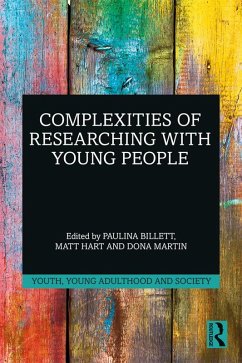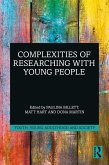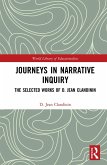Complexities of Researching with Young People (eBook, ePUB)
Redaktion: Billett, Paulina; Martin, Dona; Hart, Matt
42,95 €
42,95 €
inkl. MwSt.
Sofort per Download lieferbar

21 °P sammeln
42,95 €
Als Download kaufen

42,95 €
inkl. MwSt.
Sofort per Download lieferbar

21 °P sammeln
Jetzt verschenken
Alle Infos zum eBook verschenken
42,95 €
inkl. MwSt.
Sofort per Download lieferbar
Alle Infos zum eBook verschenken

21 °P sammeln
Complexities of Researching with Young People (eBook, ePUB)
Redaktion: Billett, Paulina; Martin, Dona; Hart, Matt
- Format: ePub
- Merkliste
- Auf die Merkliste
- Bewerten Bewerten
- Teilen
- Produkt teilen
- Produkterinnerung
- Produkterinnerung

Bitte loggen Sie sich zunächst in Ihr Kundenkonto ein oder registrieren Sie sich bei
bücher.de, um das eBook-Abo tolino select nutzen zu können.
Hier können Sie sich einloggen
Hier können Sie sich einloggen
Sie sind bereits eingeloggt. Klicken Sie auf 2. tolino select Abo, um fortzufahren.

Bitte loggen Sie sich zunächst in Ihr Kundenkonto ein oder registrieren Sie sich bei bücher.de, um das eBook-Abo tolino select nutzen zu können.
Currently, most books on youth research available on the market focus on 'how to' conduct youth research, or the research process itself. This edited collection proposes to take this process a step further and discuss the complexities of youth research from a practical and theoretical context.
- Geräte: eReader
- mit Kopierschutz
- eBook Hilfe
Andere Kunden interessierten sich auch für
![Complexities of Researching with Young People (eBook, PDF) Complexities of Researching with Young People (eBook, PDF)]() Complexities of Researching with Young People (eBook, PDF)42,95 €
Complexities of Researching with Young People (eBook, PDF)42,95 €![Routledge International Handbook of Qualitative Nursing Research (eBook, ePUB) Routledge International Handbook of Qualitative Nursing Research (eBook, ePUB)]() Routledge International Handbook of Qualitative Nursing Research (eBook, ePUB)62,95 €
Routledge International Handbook of Qualitative Nursing Research (eBook, ePUB)62,95 €![Journeys in Narrative Inquiry (eBook, ePUB) Journeys in Narrative Inquiry (eBook, ePUB)]() D Jean ClandininJourneys in Narrative Inquiry (eBook, ePUB)43,95 €
D Jean ClandininJourneys in Narrative Inquiry (eBook, ePUB)43,95 €![Classic Writings for a Phenomenology of Practice (eBook, ePUB) Classic Writings for a Phenomenology of Practice (eBook, ePUB)]() Classic Writings for a Phenomenology of Practice (eBook, ePUB)42,95 €
Classic Writings for a Phenomenology of Practice (eBook, ePUB)42,95 €![The A-Z of Social Research Jargon (eBook, ePUB) The A-Z of Social Research Jargon (eBook, ePUB)]() David RobinsonThe A-Z of Social Research Jargon (eBook, ePUB)34,95 €
David RobinsonThe A-Z of Social Research Jargon (eBook, ePUB)34,95 €![The Birth of Ethics (eBook, ePUB) The Birth of Ethics (eBook, ePUB)]() Michael van ManenThe Birth of Ethics (eBook, ePUB)43,95 €
Michael van ManenThe Birth of Ethics (eBook, ePUB)43,95 €![Re-Thinking Social Research (eBook, ePUB) Re-Thinking Social Research (eBook, ePUB)]() Beth HumphriesRe-Thinking Social Research (eBook, ePUB)45,95 €
Beth HumphriesRe-Thinking Social Research (eBook, ePUB)45,95 €-
-
-
Currently, most books on youth research available on the market focus on 'how to' conduct youth research, or the research process itself. This edited collection proposes to take this process a step further and discuss the complexities of youth research from a practical and theoretical context.
Dieser Download kann aus rechtlichen Gründen nur mit Rechnungsadresse in A, B, BG, CY, CZ, D, DK, EW, E, FIN, F, GR, HR, H, IRL, I, LT, L, LR, M, NL, PL, P, R, S, SLO, SK ausgeliefert werden.
Produktdetails
- Produktdetails
- Verlag: Taylor & Francis eBooks
- Seitenzahl: 276
- Erscheinungstermin: 22. November 2019
- Englisch
- ISBN-13: 9780429755132
- Artikelnr.: 62172937
- Verlag: Taylor & Francis eBooks
- Seitenzahl: 276
- Erscheinungstermin: 22. November 2019
- Englisch
- ISBN-13: 9780429755132
- Artikelnr.: 62172937
- Herstellerkennzeichnung Die Herstellerinformationen sind derzeit nicht verfügbar.
Paulina Billett is a lecturer in sociology at La Trobe University, Victoria. Her research explores questions of wellbeing, identity formation and lived experience with a focus on women and young people. Matt Hart is a lecturer in digital society at the University of Leicester. His research interest is the sociology of youth and digital culture. Dona Martin is an adjunct researcher at La Trobe University, Bendigo, Victoria. Dona's portfolio includes a broad area of research in education.
1. Complexities of Researching with Young People: Conceptualising Key
Issues; 2. Researching the Lives of Young M¿ori in Aotearoa New Zealand:
Creating Culturally Sensitive Methods and Theory; 3. Doing Research in
Organisations: Implications of the Different Definitions of Youth; 4. They
Look Before They Leap: Conceptualising Young People as Digitally Competent
Risk-Takers, and its Implications for Ethical Internet Research; 5.
Critical Reflections: Merits of Using Youth-Centric Technology in Keeping
Young People Safe Across Europe; 6. Digital Modes of Data Collection in
Mixed-Methods Longitudinal Youth Research; 7. Revealing Intimacy through
Digital Media: Young People, Digital Culture and New Research Perspectives;
8. Researching Young People's Experiences: An African-Centred Perspective
of Consent and Ethics; 9. Working with Complexity: Between Control and Care
in Digital Research Ethics; 10. Informed Consent as a Situated Research
Process in an Ethnography of Incarcerated Youth in Denmark; 11. The Undue
Burden of Methodological Warrant on the Voice of Disengaged Young People;
12. Critically Examining Participation, Power, Ethics, and the
Co-construction of Knowledge in a Community-Based Photovoice Research
Project with LGBTQ Former Foster Youth; 13. Participation, Positionality
and Power: Critical Moments in Research with Service-Engaged Youth; 14.
Participatory Research and Political Ecology: An Evaluation of Research
with Young Syrian Refugees in Turkey; 15. Youth in Voice: The Concept of
Voice; 16. How Contradictory Friendships Disrupted My Study of
Working-Class Girls' Residential Instability; 17. The Multicultural Youth
Australia Census: Reading Complexity and Migrant Youth Citizenship into
Survey Methods; 18. The Pressures of Building Reciprocal Relationships in
an Intergenerational Research Team.
Issues; 2. Researching the Lives of Young M¿ori in Aotearoa New Zealand:
Creating Culturally Sensitive Methods and Theory; 3. Doing Research in
Organisations: Implications of the Different Definitions of Youth; 4. They
Look Before They Leap: Conceptualising Young People as Digitally Competent
Risk-Takers, and its Implications for Ethical Internet Research; 5.
Critical Reflections: Merits of Using Youth-Centric Technology in Keeping
Young People Safe Across Europe; 6. Digital Modes of Data Collection in
Mixed-Methods Longitudinal Youth Research; 7. Revealing Intimacy through
Digital Media: Young People, Digital Culture and New Research Perspectives;
8. Researching Young People's Experiences: An African-Centred Perspective
of Consent and Ethics; 9. Working with Complexity: Between Control and Care
in Digital Research Ethics; 10. Informed Consent as a Situated Research
Process in an Ethnography of Incarcerated Youth in Denmark; 11. The Undue
Burden of Methodological Warrant on the Voice of Disengaged Young People;
12. Critically Examining Participation, Power, Ethics, and the
Co-construction of Knowledge in a Community-Based Photovoice Research
Project with LGBTQ Former Foster Youth; 13. Participation, Positionality
and Power: Critical Moments in Research with Service-Engaged Youth; 14.
Participatory Research and Political Ecology: An Evaluation of Research
with Young Syrian Refugees in Turkey; 15. Youth in Voice: The Concept of
Voice; 16. How Contradictory Friendships Disrupted My Study of
Working-Class Girls' Residential Instability; 17. The Multicultural Youth
Australia Census: Reading Complexity and Migrant Youth Citizenship into
Survey Methods; 18. The Pressures of Building Reciprocal Relationships in
an Intergenerational Research Team.
1. Complexities of Researching with Young People: Conceptualising Key
Issues; 2. Researching the Lives of Young M¿ori in Aotearoa New Zealand:
Creating Culturally Sensitive Methods and Theory; 3. Doing Research in
Organisations: Implications of the Different Definitions of Youth; 4. They
Look Before They Leap: Conceptualising Young People as Digitally Competent
Risk-Takers, and its Implications for Ethical Internet Research; 5.
Critical Reflections: Merits of Using Youth-Centric Technology in Keeping
Young People Safe Across Europe; 6. Digital Modes of Data Collection in
Mixed-Methods Longitudinal Youth Research; 7. Revealing Intimacy through
Digital Media: Young People, Digital Culture and New Research Perspectives;
8. Researching Young People's Experiences: An African-Centred Perspective
of Consent and Ethics; 9. Working with Complexity: Between Control and Care
in Digital Research Ethics; 10. Informed Consent as a Situated Research
Process in an Ethnography of Incarcerated Youth in Denmark; 11. The Undue
Burden of Methodological Warrant on the Voice of Disengaged Young People;
12. Critically Examining Participation, Power, Ethics, and the
Co-construction of Knowledge in a Community-Based Photovoice Research
Project with LGBTQ Former Foster Youth; 13. Participation, Positionality
and Power: Critical Moments in Research with Service-Engaged Youth; 14.
Participatory Research and Political Ecology: An Evaluation of Research
with Young Syrian Refugees in Turkey; 15. Youth in Voice: The Concept of
Voice; 16. How Contradictory Friendships Disrupted My Study of
Working-Class Girls' Residential Instability; 17. The Multicultural Youth
Australia Census: Reading Complexity and Migrant Youth Citizenship into
Survey Methods; 18. The Pressures of Building Reciprocal Relationships in
an Intergenerational Research Team.
Issues; 2. Researching the Lives of Young M¿ori in Aotearoa New Zealand:
Creating Culturally Sensitive Methods and Theory; 3. Doing Research in
Organisations: Implications of the Different Definitions of Youth; 4. They
Look Before They Leap: Conceptualising Young People as Digitally Competent
Risk-Takers, and its Implications for Ethical Internet Research; 5.
Critical Reflections: Merits of Using Youth-Centric Technology in Keeping
Young People Safe Across Europe; 6. Digital Modes of Data Collection in
Mixed-Methods Longitudinal Youth Research; 7. Revealing Intimacy through
Digital Media: Young People, Digital Culture and New Research Perspectives;
8. Researching Young People's Experiences: An African-Centred Perspective
of Consent and Ethics; 9. Working with Complexity: Between Control and Care
in Digital Research Ethics; 10. Informed Consent as a Situated Research
Process in an Ethnography of Incarcerated Youth in Denmark; 11. The Undue
Burden of Methodological Warrant on the Voice of Disengaged Young People;
12. Critically Examining Participation, Power, Ethics, and the
Co-construction of Knowledge in a Community-Based Photovoice Research
Project with LGBTQ Former Foster Youth; 13. Participation, Positionality
and Power: Critical Moments in Research with Service-Engaged Youth; 14.
Participatory Research and Political Ecology: An Evaluation of Research
with Young Syrian Refugees in Turkey; 15. Youth in Voice: The Concept of
Voice; 16. How Contradictory Friendships Disrupted My Study of
Working-Class Girls' Residential Instability; 17. The Multicultural Youth
Australia Census: Reading Complexity and Migrant Youth Citizenship into
Survey Methods; 18. The Pressures of Building Reciprocal Relationships in
an Intergenerational Research Team.







